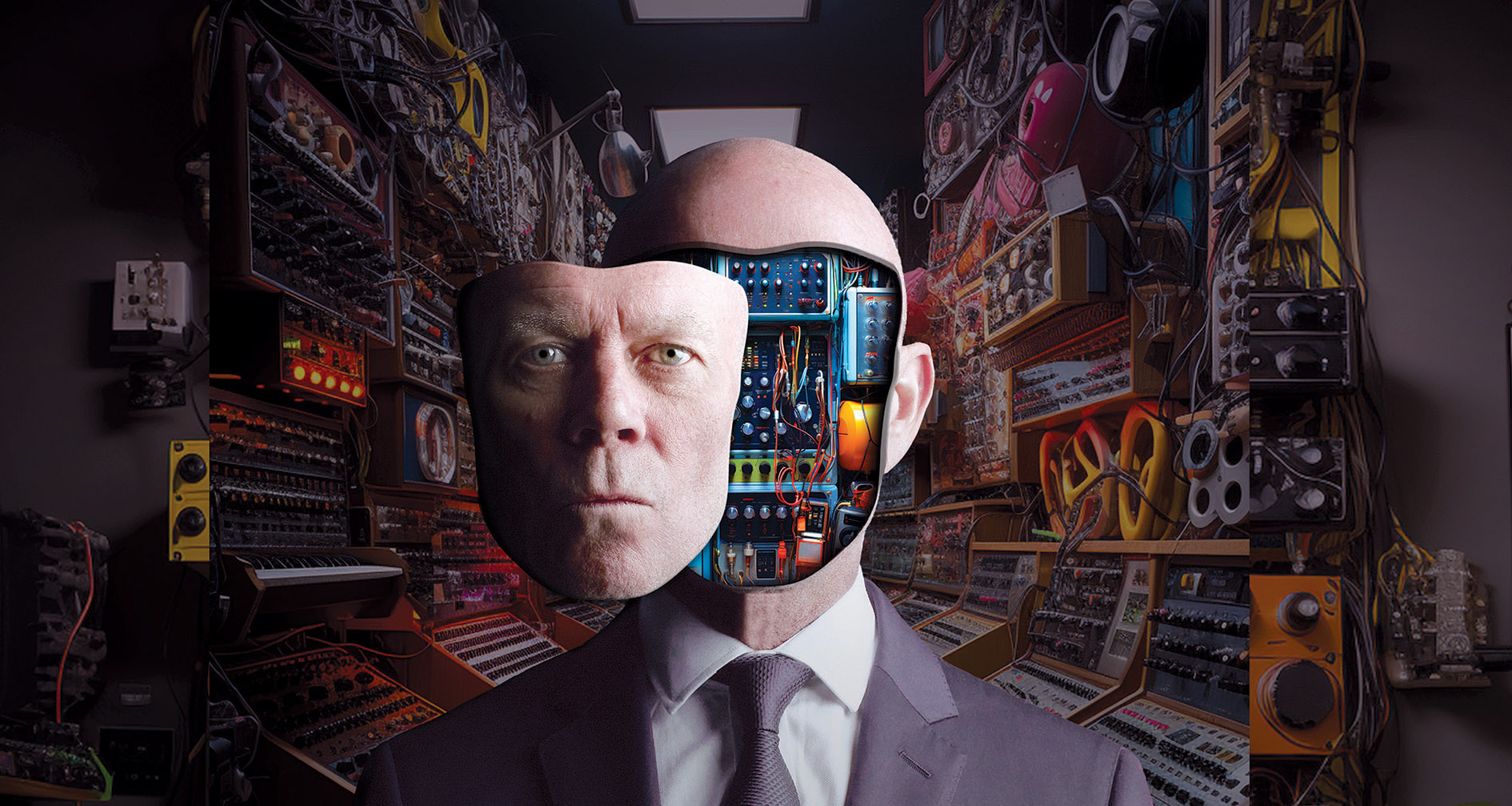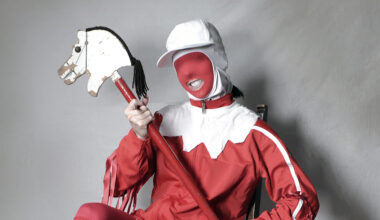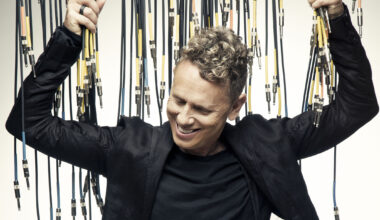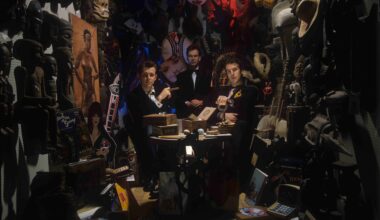As the driving force behind Depeche Mode, Yazoo, The Assembly, Erasure and countless other projects over four decades, you might think you’ve got synthpop pioneer Vince Clarke sussed. But his debut solo album, the evocative ‘Songs Of Silence’, is a major surprise. Built around drones and ambient soundscapes, it’s an unexpected and majestic left-field turn. He talks us through its gestation and reflects on a remarkable career
It’s a sweltering Monday afternoon in New York, and I’m on my way to meet revered electronic whizz Vince Clarke. Wilting in the heat and feeling a little discombobulated, I’m walking down the quiet, tree-lined Brooklyn street where Clarke lives with his American wife and son, looking up at the imposing brownstone townhouses with their grand facades and trying to take it all in. It feels slightly surreal to think that in a few moments, I’ll be face-to-face with the man himself, the “quiet genius” behind Depeche Mode, Yazoo and Erasure.
I walk up the steps to Clarke’s house and knock. He answers the door and, after a quick introduction, leads me through a hallway and straight down the stairs to his venerated basement studio. My heart is thumping – this is the engine room, where the magic happens. I’ve seen plenty of photos of it online but it feels much more intimidating and impressive up-close.
Banks of analogue synths, machines and key bits of kit line the wood-panelled walls, including the ARP 2600 and ARP Sequencer – extensively used on Depeche Mode’s ‘Speak & Spell’ – and Clarke’s trusty Sequential Circuits Pro-One, which features on all of Erasure’s albums. Lots of little spotlights are dotted around, accentuating the slightly dream-like nature of the scene.
We take a seat at the central table on which his computer sits – right at the heart of the controls, no less – and Clarke pours himself a beer. It’s a space he seems very comfortable and relaxed in, as he should. With his set-up streamlined for ease of use, he knows every bit of it intimately. Even now, almost 40 years down the line, he still gets a buzz from the process.
“I got rid of all of the stuff I never used, so everything in here is working and connected to the computer,” he explains. “And it’s always accessible. I can spend all my time just twiddling knobs, to see what happens. I’m down here maybe six or seven hours a day, but not in one go. It varies – I was in here at two o’clock this morning, messing about.”
First and foremost, we’re here to talk about Vince Clarke’s debut solo album, ‘Songs Of Silence’. Built on sonorous drones, Klaus Schulze-esque atmospherics and ambient hues, with nods to folk and opera, it’s a truly astonishing and expansive piece of work that’s both contemplative and poignant – and a world apart from the consummate electropop on which he’s forged an entire career. After more than four decades, the obvious question is… why now?
“Well, after the first leg of the last Erasure tour, Andy Bell tested positive for Covid and I got stuck in a fucking hotel for 10 days, so that was basically the end of that,” he says, matter-of-factly. “Then I found myself in lockdown with nothing to do.”
Duly ensconced in his basement studio, Clarke did what has come naturally for over 40 years – tinker. But this time it felt different. Trying to stay busy, and with few external distractions, he began to properly acquaint himself with Eurorack. Although the modular synth had been sitting in his studio for years, he’d never fully explored it.
“A lot of it works on the same principle as some of the modular stuff I have here, but there’s so much more it can do,” he reasons. “I couldn’t learn a synth without having some reason to do that. There’s an endgame, which is me getting a fantastic sound that will fit into a particular track.”
With plenty of time on his hands, online tutorials became a new-found source of fascination and an integral part of his creative journey.
“I can watch people demonstrating Eurorack modules on YouTube forever,” he says, deadpan. “I really, really enjoy it.”
Isolation also gave him the space to start work on his solo album. As the sounds he generated began to take shape and evolve into what would become ‘Songs Of Silence’, he found himself becoming increasingly immersed in his own soundscapes.
“I just got into drones, with nothing particularly happening – I spent a lot of time making them change and morph,” he reflects. “With those kinds of interactions, you can’t just hit a button and suddenly everything sounds great… you have to really, really listen. And it wasn’t like I was under any pressure. I started experimenting, adding bits and pieces, some texture.”
Clarke imposed two rules – sounds could only be generated from Eurorack, and each track had to revolve around a single note in the same key.
“I wanted it to have structure, but at the same time I liked the idea of everything being in one note,” he says. “I was quite happy listening to a track without a groove, being enveloped in a soundscape.”
What inspired the title of the record? Why ‘Songs Of Silence’?
“It’s just something that came to me,” he says. “Obviously, there’s the Simon & Garfunkel song, ‘The Sound Of Silence’, which is one of my favourite tracks. But I just felt those words had this kind of sadness and seriousness.”
You’re a big Paul Simon fan, right?
“Yeah, absolutely,” he says. “I wouldn’t have got into music had it not been for Paul Simon.”
More so than Kraftwerk, say?
“Totally. Only because Paul Simon had an album called ‘The Paul Simon Song Book’ with just him on acoustic guitar. And I thought, ‘Oh, I can do that’. But with someone like Kraftwerk, you have no idea how they get that sound.”
The roots of Clarke’s solo album can be traced right back to some of his earlier work with Martyn Ware, who he’s been friends with for years. After Ware produced Erasure’s 1994 long-player, ‘I Say, I Say, I Say’, the pair co-founded sound design company Illustrious, although Clarke is more of a sleeping partner these days. They also made two excellent albums of glacial ambient soundscapes – 1999’s ‘Pretentious’ as The Clarke And Ware Experiment, and 2001’s ‘Spectrum Pursuit Vehicle’ under their own names.
“Martyn and I did some soundscapes for the doomed National Centre For Popular Music in Sheffield about 25 years ago,” recalls Clarke. “One of the installations was this surround sound listening room. That’s really when I first started getting interested in the idea of making ambient music.”
‘Songs Of Silence’ certainly has a sombre atmosphere. Clarke describes these wordless narratives as having a sense of sorrow, of “things going bad and crumbling” – a reflection, perhaps, of the bleak lockdown environment in which they were made. But, make no mistake, it’s a hugely exhilarating and euphoric listening experience.
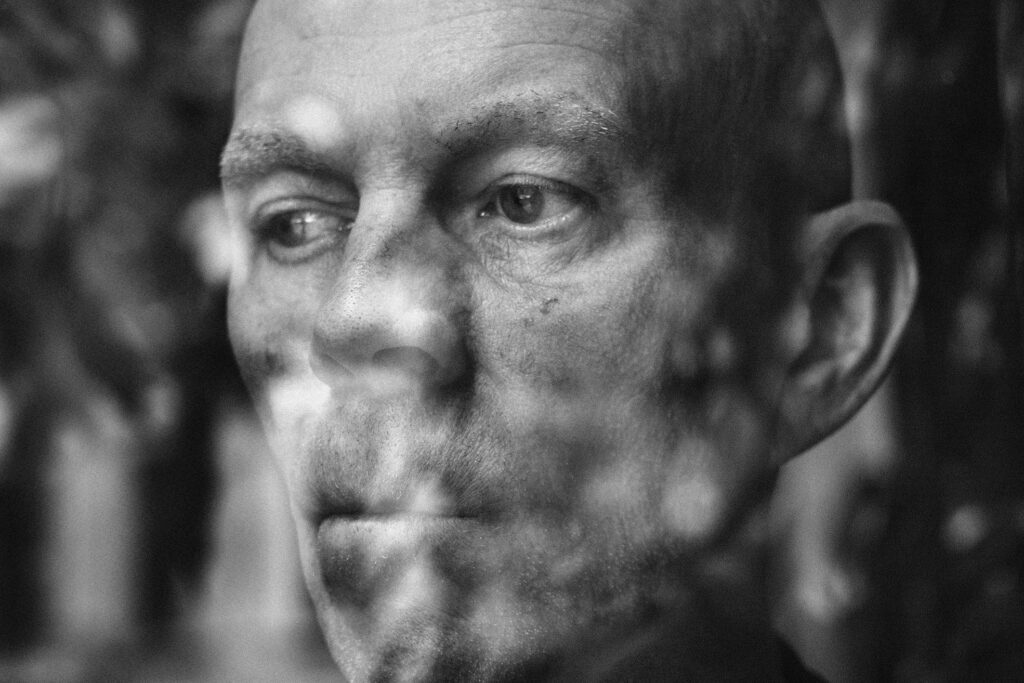
Turned up loud through headphones for maximum effect, the opening track, ‘Cathedral’, subsumes you with its resonant bass drone and lingering synth sweeps, emerging from darkness into radiant bright light. It feels like you’re flying through the air, arms outstretched, as free as a bird. The spell is broken by ‘White Rabbit’ – inspired by the scurrying character in ‘Alice In Wonderland’ – as a babbling sequencer suddenly morphs into full- on tribal drums. Then, we get the shimmering ‘Passage’, featuring operatic vocals from Caroline Joy, as beautiful as it is stirring. It’s breathless stuff.
“I didn’t really have an idea when I started how the tracks were going to sound,” admits Clarke. “But on ‘Passage’, I could really hear this human voice in my head – I liked the idea of it sounding ‘operatic’. I was listening to a couple of things… Malcolm McLaren’s ‘Fans’, one of my all-time favourite albums, and then I got tuned into Puccini’s ‘Tosca’. There was one particular aria on it, and I thought, ‘Well, that’s an interesting selection of notes’. So I got in touch with Caroline on Fiverr.”
One of the most moving cuts on ‘Songs Of Silence’ is ‘The Lamentations Of Jeremiah’. Inspired by Jeremiah (the “weeping prophet”), who authored the Book Of Lamentations in the Hebrew Bible, it’s underpinned by a heavy drone and features cello by Clarke’s good friend, Reed Hays.
“I was trying to make it sound cinematic, whatever that means,” says Clarke. “Reed’s an amazing player, the real deal. He spent a few days listening to the track and working out scales that fitted with the harmonics, then just did it as a one-off performance. I think it’s the most emotional track on the album.”
‘Blackleg’, meanwhile, is probably the album’s most intriguing track. Featuring a vocal sample from a recording of the 1844 anti-scab folk song, ‘Blackleg Miner’, it’s remarkably powerful, with nebulous synths conveying the “cover of darkness under which the scab steals away to work”. Covered by various artists over the years, most famously Steeleye Span, the original version of ‘Blackleg Miner’ is considered controversial, due to its brutal depiction of violence against strike-breakers.
“I was given a copy of that audio by Martyn Ware about 15 years ago,” explains Clarke. “I tried to work out the chord progression, but the timing’s all over the shop because it’s a cappella – I couldn’t put it into a rigid timeframe. But then I had this track that happened to be in the right key, weirdly. So I played the vocal audio over it. All I did was time it a bit better so the verses sat evenly. That’s why I could never work out the chord changes because there aren’t any – you don’t need them.”
Once the album was finished, Clarke sent it to Mute boss Daniel Miller, even though – incredibly – he wasn’t sure whether Miller would like it. His fears, of course, were unfounded.
“He came back to me quite quickly and said, ‘I really like this… I want to release it’. I was shocked, because I thought, ‘Well, it’s certainly not Erasure, and it’s definitely not as weird as Sunroof’ [laughs]. For that reason, I thought it was something that he wouldn’t be particularly interested in. So I was very surprised when he wanted to release it.”
Often referred to as the “quiet genius”, Clarke generally prefers to work behind the scenes. How does he feel putting himself in the spotlight with this album?
“It’s very strange,” he admits. “The first weirdness came when I had to name the tracks – prior to me doing that, it was just ‘Drone 1’ to ‘Drone 10’. With Erasure, Andy always takes care of that stuff – he sings the lyrics and writes most of them, so obviously he’s coming up with the titles. It took me a while to get used to making decisions about artwork and things that I normally wouldn’t bother with! [laughs].”
Given the different way of working on ‘Songs Of Silence’, does he enjoy taking himself out of his comfort zone and embracing new challenges?
“I think that’s much easier as you get older,” he says. “Because it’s not like you’re worrying about chart positions particularly, and you can certainly experiment more. You’re not trying to make something sound outrageous or unlistenable. I like the idea of having a track that’s quite conventional, and then interspersing it with things that are jarring or aren’t musical. It’s a bit like a chord change – you can build up a chord progression, and it has lots of tension and even things that are slightly wrong. But if you go back into the main body of the song, then suddenly it’s a relief. I like the emotional whoosh you get in your head from that.”
As an impressionable teenager seduced by the thrilling synth sounds happening in 1981 – the year that electronic pop really took off – I was lured in and shaped by Vince Clarke’s direct, effervescent songs right from the start. Seeing Depeche Mode perform the ridiculously catchy ‘New Life’ on ‘Top Of The Pops’, with Clarke jabbing away at his keyboard, was a crucial moment in my music education.
At school, the excitement was palpable. ‘New Life’ was on everyone’s lips. It was one of the first “hip” singles that all the cool kids bought, swiftly followed by the equally zippy ‘Just Can’t Get Enough’. Clarke has always had the enviable knack of being able to conjure and bash out great tunes, like an electropop mage.
Given the documented influences on early Depeche – pre-‘Dare’ Human League, OMD, Fad Gadget and others – was there a lightbulb moment in terms of electronic music that set him off?
“OMD was the one,” he says. “I was a teenager when we first heard ‘Electricity’, me and my friends. It was one of those things where I thought, ‘Perhaps making music or making a record is within my grasp’. It was very simple and there weren’t lots of massive synths and expensive gear, but OMD had really great tunes and ideas. I thought I could maybe tap into that. Also, I’m a terrible guitar player – I learned just enough chords to be able to write a song.”
It was actually ‘Almost’, the B-side of ‘Electricity’, that really hooked Clarke in. He even ended up remixing the track in 2016, which he describes as “a great honour”.
Back in the pre-Depeche days in Basildon, Clarke and Andy Fletcher formed nascent bands such as 1977’s No Romance In China and 1980’s Composition Of Sound, and were soon joined by Martin Gore and Dave Gahan. They became Depeche Mode in September 1980, with Gahan nabbing the name from a French fashion magazine. Clarke was engaged and driven, but there was no plan – the band’s vision was purely reactive.
“It was all basically one day to the next,” recalls Clarke. “When Depeche Mode started, we would get a gig at a pub, we’d do it, and then we’d get an offer to play another pub. I thought, ‘That’s good’. And perhaps the pub or venue after that would be slightly bigger.”
Having built a following in and around Basildon, Depeche Mode were supporting Fad Gadget at the Bridge House in London’s Canning Town in November 1980. It turned out to be a pivotal moment. Daniel Miller had been watching their performance and was impressed enough to ask them afterwards if they wanted to make a single. After some to-ing and fro-ing, they agreed, and the ball was rolling.
“We couldn’t believe that we were with a record company,” recalls Clarke. “And then we brought out the ‘Dreaming Of Me’ single which got played on the radio – we couldn’t believe that, either. There was no one thinking ahead, ‘Oh, this is the way we’re gonna go, this is how we’re going to end up’. It literally was one day at a time.”
Written by Clarke, ‘Dreaming Of Me’ got to Number 57 in the UK Singles Chart in early 1981. He also penned most of the tracks for Depeche’s 1981 debut album, ‘Speak & Spell’, including breakthrough hit singles ‘New Life’ and ‘Just Can’t Get Enough’. Things were looking up, the future looked bright. But Clarke’s time in Depeche Mode would be woefully short – there were already signs of discord, with Clarke feeling disconnected from what was happening around him. Despite critical acclaim for the band’s first releases, he abruptly upped and left.
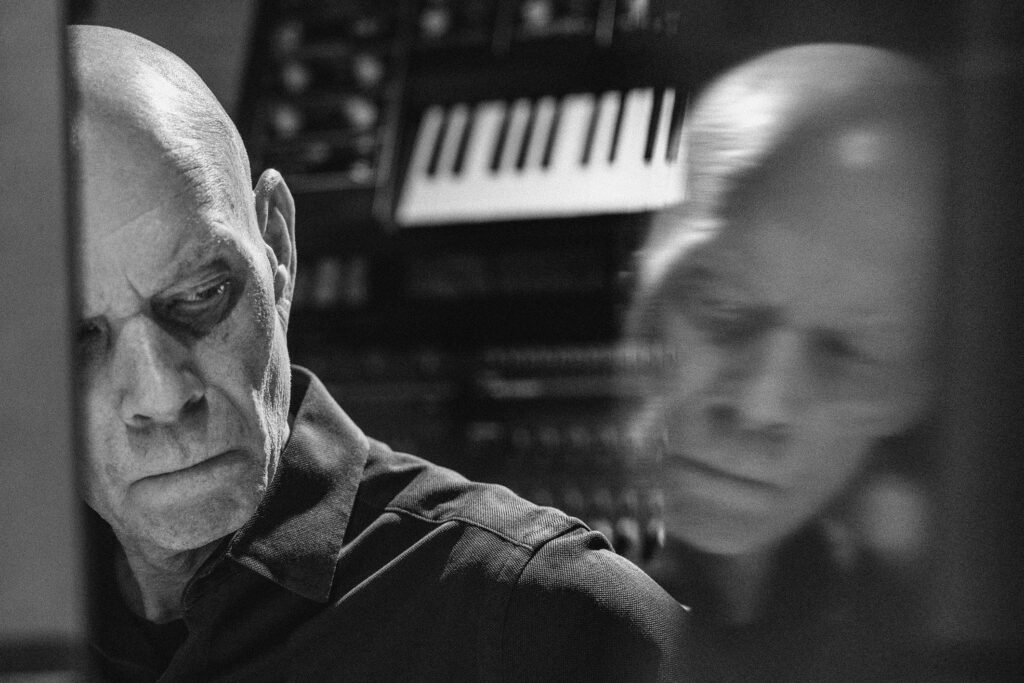
Over the years, the possible reasons for his stepping away have been touched on – musical differences, Clarke growing tired of touring and promotional duties, and wanting more control – but it’s never been properly documented. So what’s the definitive story?
“I’ve got a few pretend ones,” he sniggers. Clarke’s sense of humour is very dry, so you occasionally have to take what he says with a very big pinch of salt.
“Me and Martin Gore did that minimal techno record together [2012’s excellent ‘Ssss’, as VCMG],” he continues. “We were talking to a journalist in America, doing interviews – which was sweet, I really enjoyed it – but I couldn’t stop myself. He asked, ‘Why did you leave Depeche?’, and I said, ‘Well, I was involved in a car accident and I had a really quite serious leg injury. In the end, it just became too much, and I realised I could no longer be a member of Depeche Mode because I couldn’t stand behind a synth onstage without falling over’.
“The truth is, I really don’t remember. I honestly think it all happened so quickly for us, and there were lots of egos flying around – mostly mine. I was a control freak, for sure. When I decided to leave, it wasn’t like I was thinking, ‘I’m going to go on and do something else’. I just didn’t want to do this anymore. I assumed I’d go back to working for British Rail again, forever.”
I sense this might be an opportune moment to talk about Depeche co-founder Andy Fletcher, who died unexpectedly in May last year. He and Clarke had known each other since their schooldays.
“We were at different schools – enemy schools,” recalls Clarke. “There would be fights organised. Really funny, really stupid. Little kids, 11 and 12 years old.
He pauses for a moment.
“You know, he and I hadn’t spoken… we weren’t close, really. We were obviously very close when we started Depeche Mode. I’d seen him a few times over the years and we always got on fine. But it came out of the blue for everybody. It was quite a shock.”
They must have shared a lot of formative experiences, I suggest. What’s Clarke’s best memory of Fletch?
“Fletcher was always full of advice for everybody,” he says. “He had a very funny sense of humour… no, funny’s the wrong word. If you didn’t know Fletcher, then you wouldn’t think it was funny. If you knew Fletcher, then it was really, really funny.
“Even though we didn’t socialise regularly, we’re the same crowd – all from Basildon, all the same age. In the beginning, Fletcher and I got together to try and make music like The Cure. He bought a bass guitar, I had a guitar, and we had an amp and a drum machine. We’d spend ages in my mum’s bedroom or garage, trying to learn what chords were and write songs. That was when we were 17 and 18. I’ll always remember that – they were good times. Fletcher was really keen to learn, and I didn’t know much!”
Fast-forward to the present day. Does Clarke take an interest in what Depeche Mode are doing now?
“Yeah, I’d heard they were releasing the ‘Ghosts Again’ single shortly after Fletcher died,” he says. “The video is really… super-moving. I always like to keep tabs on what they’re doing musically and what Martin’s up to with his sounds, because he’s such a brilliant synthesist – he always comes up with interesting shit.”
Having worked with Gore as VCMG, Clarke says he would love to hook up with his former bandmate again in the future.
“I don’t know that Martin would be able to find the time, or perhaps he might not want to do it. But I enjoyed what we did together, it was fun. If the opportunity comes along, then definitely. He’s a very nice guy.”
No grudges held, then. It’s tempting to look back and wonder what might have been had he stuck around in Depeche, but he’s not one to think too deeply about the past.
“You’ve got to move on,” he asserts. “I’m sure I’ve said some horrible things to people before and made terrible decisions, but I’m not really dwelling on those. No regrets.”
After leaving Depeche Mode, Clarke claims he had no immediate or defined vision.
“I had no expectations whatsoever,” he shrugs. “I wanted to make music, for sure, and I started writing new songs. I’ve written songs since I was 15. Had I gone back to British Rail, I would still be writing music. It’s the same with this solo project. I didn’t really do it with the idea of releasing it, because I get enough satisfaction now just making it. It’s a real joy.”
But his pop trajectory was about to take another upward curve, this time under the guise of Yazoo with Alison Moyet, who he vaguely knew from Basildon. The story has been told often enough – Moyet had put an advert in Melody Maker, looking for a blues-based band, and Clarke needed a singer. Despite their differences, the stars somehow aligned. Musically, Yazoo had real energy and synchronicity, with Clarke’s synthpop earworms the perfect foil to Moyet’s husky contralto.
“I had this one song, ‘Only You’, that I’d written,” recalls Clarke. “I’d heard Alison sing in a punk band called The Vandals, which my best friend was a member of, so I just approached her. We met in person and she sang the demo, which I’d written on a little 4-track Portastudio. Then we took it to Daniel Miller.”
Miller’s initial reaction, however, was somewhat aloof.
“It was quite funny, on reflection,” says Clarke, smiling. “Mute had an office in London, which was basically a storefront. I went there with a cassette of my demo, and he was messing about with his ARP synth. He took five minutes to listen to the track – and then just went back to his ARP. At the same time, my publisher and a few others came in and happened to hear the song, while Daniel just continued twiddling his knobs. They said, ‘We think this is a really good track’. Daniel then made the decision to release it as a single. And that’s all I expected.”
There was no Yazoo album in the offing at that point. But it was the success of ‘Only You’ that led to the 1982 long-player ‘Upstairs At Eric’s’ – named in honour of producer Eric Radcliffe, in whose Blackwing Studios complex it was made, in south-east London.
“It wasn’t like Mute had loads of money, so when the single did well, Daniel decided he would pay for the recording of an album,” says Clarke. “He was just being very practical. We weren’t dealing with CBS or anything, there were no advances or money for any of the artists, really. It was basically a track at a time.”
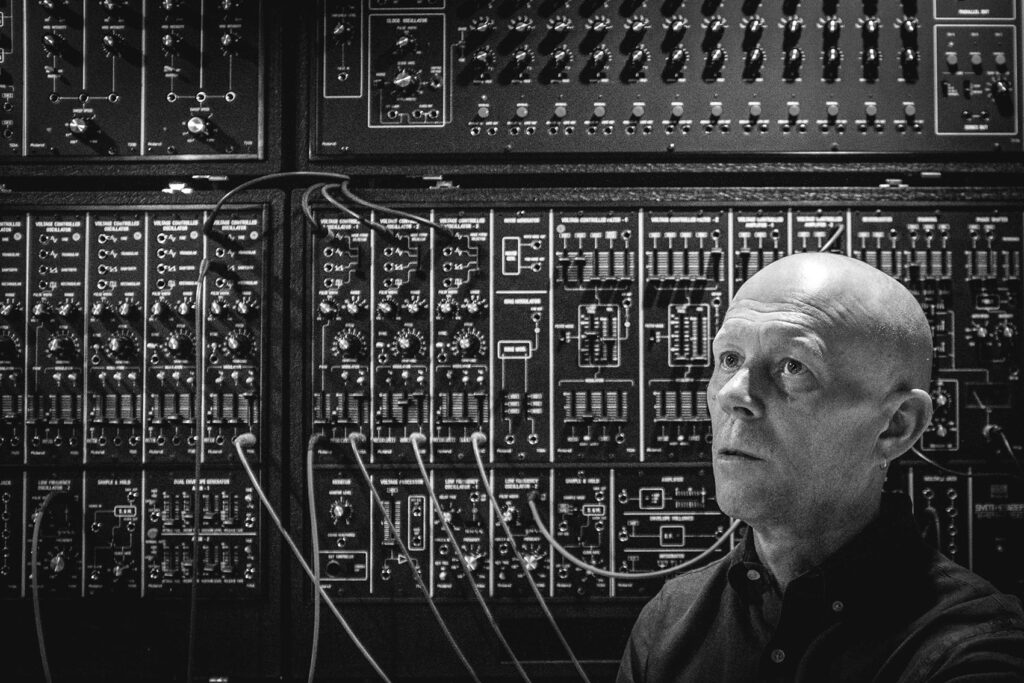
Released in March 1982, ‘Only You’ was a massive hit – further proof of Clarke’s songwriting chops. There were four more singles, but beneath the surface, the tension between him and Moyet was beginning to bubble over. 1983’s well-received ‘You And Me Both’ album was made under sufferance by Clarke, as his publisher thought it wouldn’t look good if he were to leave another band so quickly. Yazoo split acrimoniously, citing personality clashes and a lack of communication. Clarke and Moyet later reunited for 2008’s ‘Reconnected’ tour, but it was too little, too late.
Following Yazoo’s demise, Clarke embarked on another short-lived and ill-fated project – The Assembly, with Eric Radcliffe – but after just one hit single, ‘Never Never’ with Feargal Sharkey, that bit the dust too.
“I thought we would get more out of it than we did,” admits Clarke now. “And I really enjoyed working with Eric Radcliffe – he was an incredible engineer and producer, and I learned a huge amount from him. I could write the songs, but it was very difficult to find singers that were interested in singing them.”
Given Clarke’s previous success, you’d have thought they would be queuing up.
“Well, the singers that we really liked were all songwriters, and they weren’t necessarily interested in singing other people’s songs,” he says. “We spoke to a few people and recorded some of them. Neil Arthur was on one of the songs and Matt Johnson from The The, people that we kind of knew. But after that it all just folded, really.”
Having moved to Brooklyn around 20 years ago, Clarke seems to have immersed himself in life here. The next day, I’ve agreed to meet him at his favourite local bar, Gowanus Gardens, a laid-back “neighbourhood mainstay”. Co-owned by a friend of his, it has the air of a welcoming London boozer. Clarke is already there and chatting away when I arrive, so we grab drinks and head to the outside courtyard, where it’s quieter.
Talk immediately turns to Clarke’s most successful and defining project – Erasure. By far his longest stint, it’s astonishing to think that he and singer Andy Bell have been going since 1985. So many memorable singles – ‘Sometimes’, ‘The Circus’, ‘A Little Respect’, ‘Blue Savannah’, ‘Stop!’… well-crafted and accessible electronic hits. After the previous false starts with Depeche, Yazoo and The Assembly, Clarke puts Erasure’s longevity down to mostly being “very lucky” and “because we write quite good songs”. Crucially, he says, they initially built a following in the UK, USA and Germany by playing small places where the crowds gradually got bigger. He cites Andy Bell’s showmanship as a key factor, too.
“Absolutely, yeah,” agrees Clarke. “It didn’t take long for him to become this onstage persona.”
Erasure represents one of the few points in Clarke’s career where he seems genuinely settled and happy.
After the fleeting and troublesome relationships with Depeche Mode and Alison Moyet, the working relationship between him and Andy Bell has remained consistently strong. Bell currently spends half the year in Miami, Florida, and the other half in London. Although they try to catch up whenever possible, the pair mostly see each other for writing and recording.
“We just get on, really – Andy’s very low-key and we have similar ideas about politics and similar tastes in music,” says Clarke, by way of explanation. “He doesn’t take himself too seriously, and I think that rubbed off on me a little, especially when the first record didn’t happen as we would have liked it to. He has a very laid-back attitude about everything. In the beginning he was super-shy – even with me, not just the audiences – but over the years we’ve got to know each other. It turns out we quite like each other.
“I think he was intimidated at the start because we were in this fancy studio with a fancy producer. But Flood and I made a big effort to try and make him feel at ease. On our first album, ‘Wonderland’, all we did was laugh – it was one stupid joke after the next. Part of the reason for that was because we were overcompensating to make Andy feel more comfortable.”
After so many years, does he still get that same sense of fulfilment working on Erasure material?
“I love it,” he says, unequivocally. “Nowadays, with synthesisers, the sky’s the limit. You can just keep going forever and ever. The best part about it is when Andy and I get together and write a song because we don’t have preconceived ideas or a plan – just a blank piece of paper. And then after an hour or two you get something that appears out of that. It’s a miracle, it really is.”
And despite the stop-start nature of his early career, Clarke has stayed with Mute throughout. That’s proper loyalty. What’s the appeal?
“Well, it’s the coolest label in the UK,” he shoots back. “Daniel really is a huge music fan. The stuff that comes out on Mute is all over the shop, and very inspiring. We have a real one-on-one personal relationship. We never signed any contracts, it was just a handshake, all done on trust. The deal is, ‘You make the record, we’ll pay for 50 per cent. After costs, we split the profit’. Same as all the old Rough Trade deals, back in the day – that’s what Daniel based it on.”
When Depeche Mode were first finding their feet and recording at Blackwing, Miller would advise Clarke on how to arrange songs, use the studio technology and get specific sounds. In many ways, the Mute founder has become something of a mentor over the years.
“Our relationship’s really changed,” says Clarke. “When we first met him, he was so much older. Then you get older yourself, and that separation gets less and less. I love Daniel, he’s such a good bloke – so supportive, and always interested in what you’re up to. And now he’s making music himself again, so we’ve always got something to talk about.”
Something of a restless soul, Clarke confesses to having “the patience of a newt”. Always with fingers in various pies, he never seems to switch off, flitting from one thing to the next. You imagine his mind is a hive of crazy activity, constantly buzzing with ideas – flip open his head, and you’d probably find a tangle of connected patches, cables and circuits. In Clarke, the electronic force isn’t so much strong as completely hard-wired.
As well as Erasure and the new solo material, there’s usually a high-profile remix or two on the go, to add to the vast array he’s already done for the likes of Sparks, Soft Cell, Nitzer Ebb and many more. His re-rub of Alka’s (American producer Bryan Michael) version of Pink Floyd’s ‘On The Run’ is astonishingly good, a real techno banger. It’s quite possibly one of his finest remixes to date.
“What Bryan did was replicate that track exactly,” he says. “And the EMS synthesiser he used, he built himself from scratch. He’s a bit of a genius.”
In addition to his collaborations with Martyn Ware and Martin Gore, he’s worked with electronic luminaries such as Jean-Michel Jarre, Paul Hartnoll (as 2Square), BT and countless others, in various producerly guises. Being so prolific, does he ever reflect on the vast array of music he’s composed over the years?
“I can’t say I really do,” he says. “When we make an Erasure album, I rarely listen to it once we’re done because the moment was in the creation. Andy will listen back to old stuff when we’re working out what to play on tour. But for me, it’s not about ‘then’ – it’s about ‘now’.”
Clarke’s electronic label VeryRecords is still going too, although he says operations were slowed by the pandemic. And he co-hosts an occasional radio programme, ‘The Synthesizer Show’ – what else? – with his pal Reed Hays. Available to stream online, it’s well worth looking up. The pair spin early, experimental, classic and contemporary electronics, have entertaining little chats between songs (“about the weather, synths or whatever takes our mind”), and chuckle together a lot. It’s a lovely thing. The playlists, says Clarke, are inspired in part by these very pages.
“I look through your reviews, because there are so many – stuff that I would never have found otherwise,” he admits. “It makes up a good 50 per cent of what we play.”
But for Clarke, it’s not just about music – animation is another important string to his bow. He has a YouTube channel (Vince Clarke Animation) featuring his output to date, in all its quirky glory. Where did the spark for that come from?
“It was one of those things I thought of maybe 10 years ago,” he says, instantly warming to the theme. “I was probably on tour, so there’s a lot of time to sit around. I was interested in learning computer animation so I started digging into it. I bought a few programs but I couldn’t understand them. Then recently, I discovered this much simpler one called Adobe Animate. I started doing online one-to-one classes with an animator in California and just fell in love with it.
“It’s really time-consuming, but I like spending time on detail. It’s that control freak thing. I’m in control of everything – not only the music but also writing the scripts and what the characters say, controlling how the actors look and how they sound. It’s such a satisfying process.”
He’s literally involved in each element – sketching characters and scenes, finding voice actors on Fiverr and, naturally, composing the sparse electronic backing for each episode. There’s a deliciously offbeat and slightly macabre series of very short animations titled ‘The Interesting World Of Günter Finn’, where the gruff titular character makes rudimentary statements such as, “Today, I would like to yodel for 15 seconds” or “Today, I would like to do my incredibly accurate impersonation of Mr Andrew Bell”. It’s hilarious. Günter Finn sounds suspiciously like Clarke. Is it him?
“Yeah,” he smiles. “It’s all just one-line puns. Neil Arthur said to me that there was a skit on ‘The Fast Show’ [‘Jesse’s Diets’] where the guy would come out of his shed and go, ‘Today, I am going to suck on a maggot’ or whatever, and then go back in. I wasn’t stealing them but maybe that’s where I subconsciously got the idea.”
Has Andy Bell seen the one about him?
“It’s quite interesting… I think he likes them because they’re clever, but other people like them because they’re funny. Obviously everybody’s sense of humour is different. Some people take it too literally and just don’t get it.”
His ‘Bacon & Eggs’ animations, featuring a talking rasher of bacon and his fried egg chum, are wonderfully observed too. The first episode finds our protagonists glued to a shopping channel advertising an “80s synth band starter kit” (“Now you too can croon like Phil Oakey!”).
“The joke in that one was that people think synthesisers play themselves – and as it turns out, they kind of do,” says Clarke. “You don’t need talent to play a synthesiser and make electronic music.”
At the time of writing, there are 10 ‘Günter Finn’ and three ‘Bacon & Eggs’ episodes, with the promise of more to come. He claims to be doing it primarily for his own indulgence, but are there plans to try and showcase his work to a wider audience?
“Obviously, if Netflix offered me a million quid, I might well consider it,” he says.
As the interview starts to wind down, I throw a few quickfire questions at him. What would young Vince think of older Vince?
“He’d be amazed that he’s still making money out of music.”
And as a music industry veteran, does he have any wise nuggets of advice for his younger self?
“What I’ve learned from Andy is not to take things too seriously,” he reveals. “I think I’m better now than I was. And I’ve since learned a few tricks to cope with whatever stress is going on. First thing is, never read an interview or a review… ever.”
Wow. When was the last time you actually read one?
“About 20 years ago. Because it’s gone, isn’t it? What I’ve talked about, even the most ridiculous things, I’m sure I’d wish I hadn’t said them. But I can’t do anything about it – so that’s why I won’t read this interview.”
With our time nearly up, Clarke reveals that he’s hoping to perform ‘Songs Of Silence’ live at some point.
“Not as a concert but more a kind of event, really,” he says, enigmatically.
And, with momentum behind him, he’s already working on more solo material too.
“I’ve started writing and recording new stuff. Not in the same vein as ‘Songs Of Silence’, because I didn’t want to make more drone tracks, but things that are a bit more random. I really like generative music – Eno- type stuff. And I’ve got a lot of Erasure tracks written for Andy to hear. I’m looking forward to hooking up with him again. I have my new set of rules for that particular record – I think it’ll make for an interesting album.”
He refuses to tell me what those parameters are, but perhaps that’s for the best. For now, let’s just wallow and revel in the gorgeous “electronic vistas” that make up ‘Songs Of Silence’.
Vince Clarke’s solo album has been a very long time coming, but it’s been more than worth the wait. Having worked completely on his own terms for the first time, and with infinite sonic avenues and nuances still to explore, it feels like the quiet genius is only just getting started.
‘Songs Of Silence’ is released by Mute
